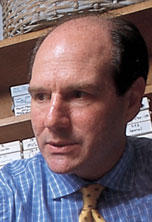

Centenary
News Service
2911 Centenary
Boulevard
Post Office
Box 4188
Shreveport
Louisiana
71134-1188
Telephone
318 869-5120
Fax
318 841-7266
Email
news@centenary.edu
FOR IMMEDIATE RELEASE (10/03)
Contact: Lynn Stewart, Centenary News Service, 318-869-5120
Centenary Professor's Research, Appearing Oct. 29 in Journal of Neuroscience, Sheds Light on Fetal Alcohol Syndrome and How Alcohol Disrupts Neural Development
 Dr. David Coppola, Douglas-Whited Chair of Neuroscience, Centenary College |
|
SHREVEPORT, LA—In a research article to appear in the Oct. 29 issue of the Journal of Neuroscience, Dr. David Coppola, Mary Amelia Douglas-Whited Professor of Neuroscience at Centenary College, and his colleagues from the Medical College of Virginia, report new findings on Fetal Alcohol Syndrome (FAS), a major cause of learning and sensory deficits.
It has long been suspected that the disabilities associated with FAS result from disruption of brain development and plasticity—the brain's ability to change in response to sensory information.
Alcohol exposure during the third trimester of human gestation may have especially severe and long-lasting consequences on learning and sensory processing because this is when the functional properties and connectivity of brain cells start to develop.
Coppola and his colleagues studied the visual part of the brain of developing ferrets, an animal model with a well-characterized form of developmental plasticity. Their findings show that alcohol exposure during a brief period of prenatal development impairs the brain's ability to change in response to postnatal visual stimulation.
This model provides a novel approach to investigate the consequences of FAS and may help elucidate how alcohol disrupts neural development.
- 30 -